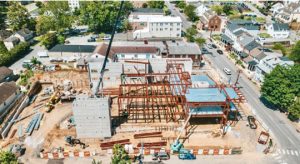They’re not “red light cameras” that photograph a car running a red light and then send out a citation. But LPRs, or License Plate Readers, do read and record a license plate number, and Concord Township Council is considering buying some. No decision will be made before April.
Shawn Petty, the CEO of Platelogiq in Exton, made a pitch to Concord Council during the township’s March 1 meeting. With him was Lt. Jon Sunderlin, barracks commander at Pennsylvania State Police Media Station.
Council Woman Vinita Deshmukh said it was the state police who recommended the township look at what Platelogiq has to offer with its LPRs. She said the hope is to make Concord Township a safer place.
Petty said that Platelogiq works on the premise that “the more we can detect, the more we can prevent. … The way we do that is by constantly, aggressively modifying and improving our software.”
He explained that allows them to have a superior ability to capture the number and state of the license plate as well as the color of the vehicle. But he said that information is only shared with law enforcement and only when police request assistance.
The information is web-based, accessible only by law enforcement, Petty said. “We do everything in high definition to give our law enforcement partners the maximum amount of clarity and investigative capabilities.”
And he stressed that law enforcement agencies are Platelogiq’s only clients. No information is given or sold to anyone else.
His company has more than 200 stationary cameras currently operating that scan 12 million license plates per week, he said. There are also 230 mobile cameras on police patrol vehicles.
Petty said Platelogiq does not alert police to incidents. Instead, the police come to them to access recorded information from a given place and time when they are investigating incidents that either took place in that area or if a suspect vehicle might have driven through a given intersection or on a certain road.
Sunderlin told council members that such a camera system, had it been in place, could have helped solve a hit and run accident on Route 202 a few years ago.
Police have solved several hit-and-run accidents in the region by using Platelogiq. Petty said his system has been used to catch retail theft rings and even helped police identify a bank robber within five minutes of the crime, just by law enforcement being able to access the license plate through Platelogiq.
And it’s not just crimes or accidents that need investigation. Petty said his system could be used to help find missing people, such as the elderly who may have memory problems and lose track of where they are or how to get home.
Cost is a factor. The municipality pays for the equipment through an annual fee. There are six locations currently under consideration for LPR placement in Concord: the intersection of Routes 1 and 202, Route 202 and Ridge Road, Route 202 and Johnson Farm Lane, Route 1 and Evergreen Drive, Routes 1 and 322, and Route 322 and Fellowship Drive.
Should council members approve buying the LPRs and installing them at all six locations, the five-year fee would be $235,000. Council President Dominic Pileggi, who indicated he favored installing at least some units, said that he would want Chadds Ford Township to share payment for LPRs at intersections the two townships share.
At least one council member, Co-Vice President John Crossan, expressed concern about privacy and civil liberty.
During a dialogue between Crossan and Petty, Petty repeated that the LPRs don’t capture any information that is individually identifiable. While they can capture license plate information, that doesn’t indicate who is driving or who might be in the vehicle. He also added that cell phones are much more personally identifiable and can track the individual.
“I can’t look up anything personal about you,” petty said.
Crossan pressed his concern.
“I’m struggling how it’s not personally identifiable,” he said. “The whole purpose seems to be to identify people. So, if your level of detail indicates the license plate number, etc., that’s tied to registration, that’s tied to an individual. That is the purpose, to track and find people.”
Petty responded by saying he couldn’t go into the system and look for vehicle license plate numbers associated with a given person. Police can through various state databases, but Platelogiq can’t.
“We don’t have a tie-in with state police systems.”
Petty said his company is not tracking people, not selling data.
“We are 100 percent laser-focused on that never happening. We don’t collect any information that is personally identifiable,” he said, adding that the identity or whereabouts of a person can only be developed by law enforcement through an investigation. LPRs are just a tool for police to do their job.
And he repeated that no one other law enforcement gets access to the system, not even elected officials.
“If you can’t access the state police system, you can’t access our system.”
Again, members made no decision of any kind during the March 1 meeting. Council members will take the next month to gather more information and consider what they think is best and, possibly make a decision in April.
About Rich Schwartzman
Rich Schwartzman has been reporting on events in the greater Chadds Ford area since September 2001 when he became the founding editor of The Chadds Ford Post. In April 2009 he became managing editor of ChaddsFordLive. He is also an award-winning photographer.



Comments